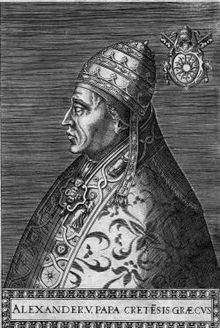- Antipope Alexander V
-
Alexander V
Antipope Alexander V (1409–1410)Papacy began June 26, 1409 Papacy ended May 3, 1410 Predecessor Benedict XIII (Avignon claimant) Gregory XII (Roman claimant) Successor Antipope John XXIII Opposed to Benedict XIII (Avignon claimant) Gregory XII (Roman claimant) Personal details Birth name Petros Philargos Born 1339
Neapoli, Crete, Republic of VeniceDied May 3, 1410 (aged 70–71)
Bologna, Papal StatesNationality Greek Denomination Roman Catholic Other Popes and Antipopes named Alexander Papal styles of
Alexander V
Reference style His Holiness Spoken style Your Holiness Religious style Holy Father Posthumous style Unknown Alexander V (also Peter of Candia or Peter Phillarges, ca. 1339 – May 3, 1410) was antipope during the Western Schism (1378–1417). He reigned from June 26, 1409, to his death in 1410 and is officially regarded by the Roman Catholic Church as an antipope.
Life
Alexander V was born in Crete in 1339 of Greek descent.[1][2] He was originally named Petros Philargos, but is often known by the Italian version of this name, Pietro Philarges.[3] He soon entered the Franciscan order, and his abilities were such that he was sent to study at the universities of Oxford and Paris. While he was in Paris the Western Schism occurred; Philarges supported Pope Urban VI (1378–89). He settled in Lombardy, where, thanks to the favour of Giangaleazzo Visconti, the Duke of Milan, he became bishop, first of Piacenza (1386), then of Vicenza (1387), then of Novara (1389), and finally Archbishop of Milan (1402).
On being created cardinal by Pope Innocent VII (1404–06) in 1405, he devoted all his energies to the reunion of the Church, in spite of the two rival popes. He was one of the promoters of the Council of Pisa and his politicking incurred the displeasure of Pope Gregory XII (1406–15), who ordered Philarges deprived of both his archbishopric and his cardinalatial dignity.
At the Council of Pisa (from March 25, 1409), the assembled cardinals chose Philarges as the new prelate for a chair they presumed was vacant. He was crowned on June 26, 1409, as Alexander V, making him in reality the third rival pontiff.
During his ten-month reign, Alexander V's aim was to extend his obedience with the assistance of France, and, notably, of Duke Louis II of Anjou, upon whom he conferred the investiture of the Kingdom of Sicily, having removed it from Ladislaus of Naples. He proclaimed and promised rather than effected a certain number of reforms: the abandonment of the rights of "spoils" and "procurations," and the re-establishment of the system of canonical election in the cathedral churches and principal monasteries. He also gave out papal favours with a lavish hand, from which the mendicant orders benefitted especially.
Alexander V suddenly died while he was with Cardinal Baldassare Cossa at Bologna, on the night of 3–4 May 1410. His remains were placed in the church of St. Francis at Bologna. A rumour spread that he had been poisoned by Cossa, who did succeed him as Antipope John XXIII (1410–15). Whether Alexander V was a pope or an antipope is still a matter of debate, although he is not currently listed by the Vatican as a pope.
References
- ^ Hughes, Philip (1947). A History of the Church: The Revolt Against the Church: Aquinas to Luther Volume 3. Continuum International Publishing Group. p. 533. ISBN 0722079834. "Alexander V was Greek (Cretan)"
- ^ Holton, David (1991). Literature and society in Renaissance Crete. Cambridge University Press. p. 3. ISBN 052132579X. "After studying at Oxford and Padua (1357) he taught as a professor in the University of Paris, and at the end of his career was elected pope as Alexander V (1409—10), the only Greek to ascend the papal throne since early medieval times"
- ^ "Alexander (V).". www.britannica.com. http://www.britannica.com/EBchecked/topic/14134/Alexander-V. Retrieved 2009-09-27. "Alexander (V) antipope e byname Peter Of Candia, Italian Pietro Di Candia, original Greek name Petros Philargos born c. 1339, Candia, Crete died May 3, 1410, Bologna, Papal States antipope from 1409 to 1410."
External links
 "Pope Alexander V". Catholic Encyclopedia. New York: Robert Appleton Company. 1913.
"Pope Alexander V". Catholic Encyclopedia. New York: Robert Appleton Company. 1913.- The Peter of Candia Homepage
Popes of the Western Schism 
Antipopes of the Roman Catholic Church Hippolytus · Novatian · Felix II · Ursicinus · Eulalius · Laurentius · Dioscorus · Theodore · Paschal · Constantine II · Philip · John VIII · Anastasius · Christopher · Boniface VII · John XVI · Gregory VI · Benedict X · Honorius II · Clement III · Theodoric · Adalbert · Sylvester IV · Gregory VIII · Celestine II · Anacletus II · Victor IV (1138) · Victor IV (1159–1164) · Paschal III · Callixtus III · Innocent III · Nicholas V · Clement VII · Benedict XIII · Alexander V · John XXIII · Clement VIII · Benedict XIV · Felix V · Modern claimants to the papacy This article incorporates text from a publication now in the public domain: Chisholm, Hugh, ed (1911). Encyclopædia Britannica (11th ed.). Cambridge University Press.Categories:
This article incorporates text from a publication now in the public domain: Chisholm, Hugh, ed (1911). Encyclopædia Britannica (11th ed.). Cambridge University Press.Categories:- 14th-century births
- 1410 deaths
- 14th-century Roman Catholic bishops
- 15th-century Roman Catholic bishops
- Antipopes
- Archbishops of Milan
- Bishops of Novara
- Bishops of Piacenza
- Bishops of Vicenza
- Franciscans
- Greek cardinals
- Greek Roman Catholics
- Religious leaders from Crete
- University of Paris alumni
- Western Schism
- Burials at San Francesco (Bologna)
Wikimedia Foundation. 2010.

